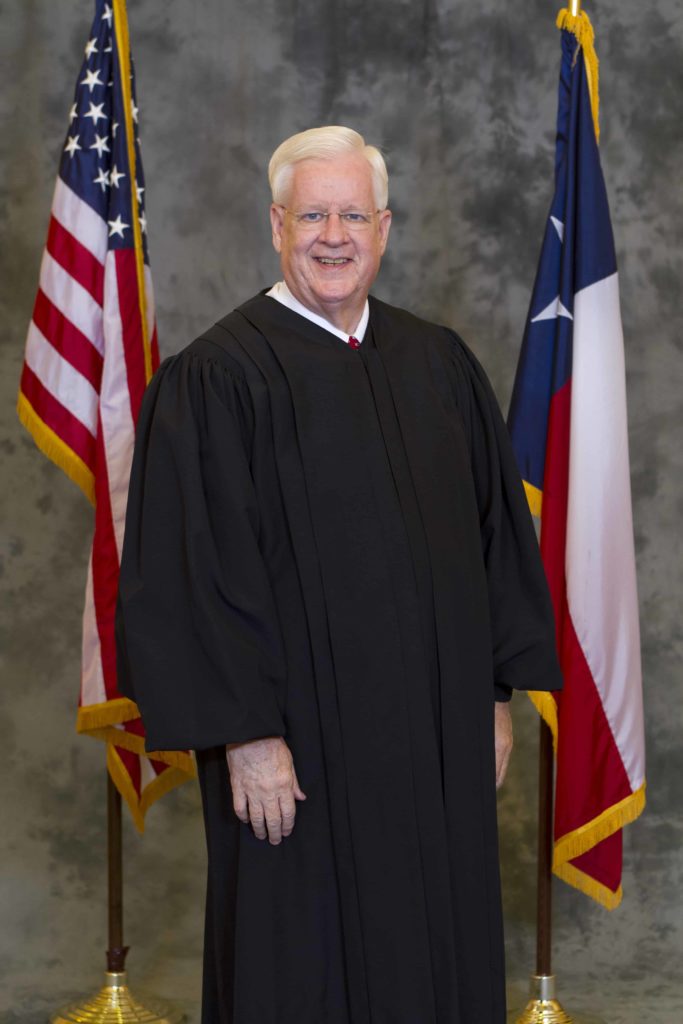Since the COVID-19 pandemic hit at the end of March, the number of jury trials in Texas can be counted on one hand.
In all, more than 3,800 civil and criminal jury trials scheduled in courtrooms across Texas have been postponed indefinitely during the past five months.
Last week, the Texas Supreme Court issued its 22nd emergency order banning nearly all jury trials until Oct. 1, which will leave an estimated backlog of more than 5,000 cases languishing on the calendars of judges across the state.

A handful of judges across Texas have started experimenting with jury trials, but those courts are few and far between.
The truth is, according to exclusive interviews with state Supreme Court Chief Justice Nathan Hecht and several judges across Texas, it may be several additional months – possibly not until next spring – before jury trials are able to resume at a normal pace.
“We just don’t know; it could be a while,” Chief Justice Hecht told The Texas Lawbook in an interview Friday. “We went from 140 jury trials a week to zero. By the end of next month, we will be about 4,400 jury trials behind.”
Legal experts say the pandemic has placed the trial courts in an impossible situation.
On one side, there is the legal principle that “justice delayed is justice denied.” At the same time, court officials know that an outbreak traced to a jury trial could lead to widespread distrust in the justice system and could cause citizens to refuse to serve on future juries.
“There is a worry out there about the negative impact this could have on juries,” Chief Justice Hecht said. “It is hard to see a clear path forward at this time.”
Under the Texas Supreme Court emergency order, district courts may conduct in-person hearings and trials if they meet certain standards, including meeting local health department standards and obtaining approval from the state’s Administrative Office of Courts.
Multiple courts submitted plans in July that obtained approval.
“We had 15 to 20 jury trials approved and were scheduled in July, but just about every time, a spike in cases came and everyone pulled back,” Chief Justice Hecht said. “We had another 15 to 20 teed up for August. We will see.”
“The biggest problem for most of our courts is logistics,” he said. “In some courthouses, just getting the number of jurors needed in elevators and up to the courtrooms is problematic.”
Texas District Judge Steve Smith of Brazos County conducted a three-day criminal jury trial a week ago in an aggravated assault case.
The court summonsed 70 prospective jurors. Fifth-five showed up. Three were sent home because they had been in contact with a person who tested positive for COVID-19. An additional 10 were dismissed by agreement of the parties.
To conduct jury selection in a space that allowed 55 people to socially distance, the court had two options: The Brazos Center and the old First Baptist Church building, which is now owned by the county.
“I preferred the Brazos Center, but I got bumped from the Brazos Center by the 4-H Club bake sale,” said Judge Smith, who settled for the old church sanctuary.
During the trial, court officials checked the temperature of jurors as they entered the courthouse and questioned them about people they had been around. In the courtroom, jurors were spread out – some in the jury box and several in the gallery. All jurors wore masks or Plexiglas face shields provided by the court.
“Witnesses took off their masks to testify, and the bailiff sanitized the witness box and replaced the microphone covering after each witness,” the judge said. “I talked to the jurors after the trial and they said they felt we had taken the necessary steps to keep them safe.”
The first in-person jury trial conducted in Texas during the pandemic was handled in early June by U.S. District Chief Judge Barbara Lynn in Dallas. See details of that case here.
In late June, Judge Bill Miller in Bowie County District Court became the first state court to conduct an in-person jury trial since the courts closed in late March. He and his staff used many of the safety techniques employed by Judge Lynn in federal court.
There are a handful of other jury trials set for this month. For example, Tarrant County is set to start a capital murder trial in the next two weeks in which the defendant is representing himself.
In Austin and San Antonio, courts are taking steps to conduct two trials using remote technology.
“This is a six-person virtual jury trial just to help us get a feel for whether conducting trials like this are viable,” Chief Justice Hecht said.
